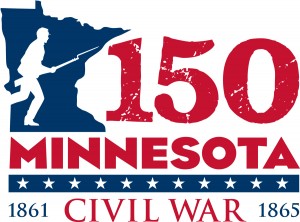Minnesota Civil War Commemoration Task Force
(www.mncivilwar150.com and “Minnesota Civil War 150” on Facebook)
Major Highlights for the Week
Wednesday February 18, 1863
General P.G.T. Beauregard commanding from Charleston, warned Confederates against anticipated attacks on either Charleston or Savannah, Georgia.
Two divisions of Confederate Lieutenant General James Longstreet’s corps from the Army of Northern Virginia were ordered to move from Fredericksburg to east of Richmond to protect the capital from Federal threats through the Peninsula or south of the James River.
Thursday February 19, 1863
Skirmishing broke out as Major General Ulysses Grant’s army continued Federal reconnaissance north of Vicksburg, Mississippi.
At Liverpool and Carlisle, Great Britain, participants in two mass meetings supported President Abraham Lincoln’s Emancipation Proclamation.
Friday February 20, 1863
Skirmishing occurred near Fort Halleck, Dakota Territory, between Federal troops and Indians; and in Tennessee on the Shelbyville Pike.
The Confederate Congress approved an act providing for the issuance of bonds for funding treasury notes. Currency and coins in small denominations were scare in the North where merchants were issuing personal notes of one, two and three cents value.
Saturday February 21, 1863
Two Federal gunboats attacked Confederate batteries at Ware’s Point on the Rappahannock River in Virginia. President Abraham Lincoln held a public reception at the White House in Washington, where the social life had been increasing lately.
Sunday February 22, 1863
On this anniversary of President George Washington’s birth, ground was broken in Sacramento, California for the Central Pacific Railroad, while fighting occurred at Tuscumbia, Alabama, and on the Manchester Pike in Tennessee.
Monday February 23, 1863
President Abraham Lincoln accepted the resignation of former Secretary of War Simon Cameron, who was serving as the minister to Russia.
Union meetings were held at Cincinnati, Ohio; Russellville, Kentucky, and Nashville, Tennessee.
Tuesday February 24, 1863
On the Mississippi River, the Federal gunboat U.S.S. Indianola was attacked in the evening by four Confederate vessels including the Queen of the West, which the Confederates recently captured. Rammed repeatedly, the Indianola fought at close quarters. After seven blows, Lieutenant Commander George Brown surrendered the Indianola, making it a serious blow to the river operations below Vicksburg.
Arizona Territory was formally organized by the United States as a separate entity from New Mexico Territory.
Where Minnesota Regiments were the week of February 18-24, 1863
1st Minnesota Volunteer Infantry – In camp near Falmouth, Virginia until April 1863.
2nd Minnesota Volunteer Infantry – On duty at Nolensville, Tennessee.
3rd Minnesota Volunteer Infantry – In camp at Columbus, Kentucky until March 14, 1863.
4th Minnesota Volunteer Infantry – Duty at White’s Station and Memphis, Tennessee until February 24, 1863.
5th Minnesota Volunteer Infantry – Companies B and C had rejoined the regiment, which was on duty at Jackson, Tennessee, until mid-March 1863. Company D was the only regiment remaining in Minnesota in detached service and rejoined the regiment in mid-February 1863.
6th Minnesota Volunteer Infantry – On garrison duty at Fort Snelling, Glencoe, Forest City and Kingston until February 1863.
7th Minnesota Volunteer Infantry – On garrison duty in Mankato and other points in Minnesota until June 1863.
8th Minnesota Volunteer Infantry – On frontier duty at various points in Minnesota: Anoka, Princeton, Monticello, Kingston, Manannah, Paynesville, Fort Ripley, Sauk Center, Pomme de Terre, Alexandria and Fort Abercrombie until May 1864.
9th Minnesota Volunteer Infantry – On garrison duty in various frontier Minnesota communities until June 1863.
10th Minnesota Volunteer Infantry – Regiment on detached service for garrison duty at various outposts in frontier Minnesota until June 1863.
1st Regiment Minnesota Cavalry “Mounted Rangers” – Organized at St. Cloud, St. Peter and Fort Snelling for frontier duty against Indians until June 1863.
Brackett’s Battalion of Minnesota Cavalry – On duty at Fort Donelson, Tennessee.
1st Minnesota Light Artillery Battery – On march to Lake Providence, Louisiana for duty.
2nd Independent Battery, Minnesota Light Artillery – On duty at Murfreesboro Tennessee until June 4, 1863.
2nd United States Sharpshooters, Company A – In camp at Falmouth, Virginia.


